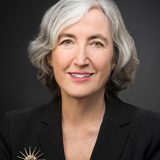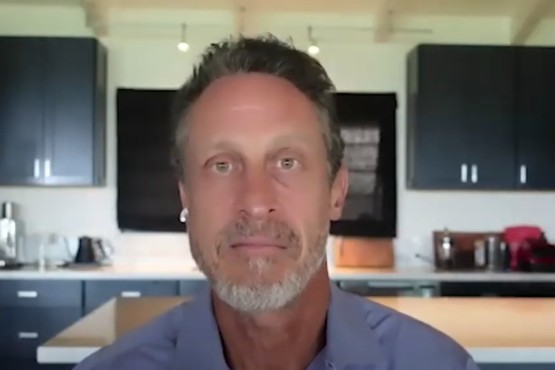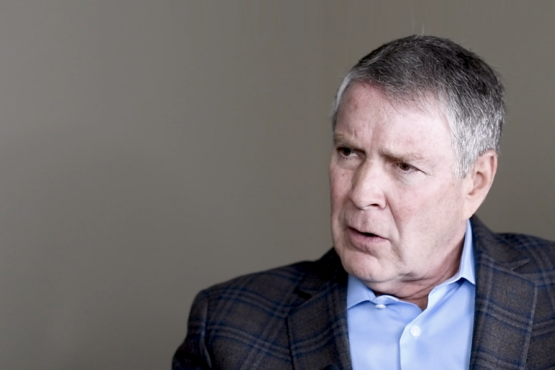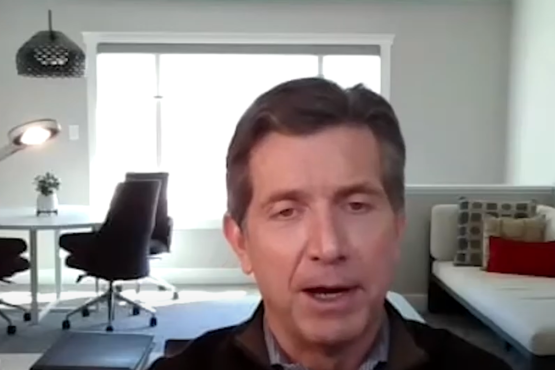Today on A Second Opinion, we bring you our third special episode in our continuing series of providing the most up to date coverage on the 2019 novel coronavirus. This is important information you can use today directly from the most trusted source, the CDC. I’m your host, Senator Bill Frist. We’re joined today by Dr. Anne Schuchat, principal deputy director of the Centers for Disease Control and Prevention. She’s played leadership roles in CDC emergency responses including the 2009 H1N1 pandemic influenza response, the 2003 SARS outbreak, and the 2001 bioterrorist anthrax response. We are taping on Wednesday, March 11th. This is a rapidly evolving epidemic changing day by day. So please continue to follow the very latest recommendations by the CDC.
Anne Schuchat:
This virus is new. We’re learning every day, but what we’ve learned so far is that for most people it’s going to be a mild illness if even that, but for the elderly with underlying conditions or for people with severe medical conditions and the facilities and organizations that care for them, this can be devastating.
Bill Frist:
Today on A Second Opinion, we bring you our third special episode in our continuing series of providing the most up to date coverage on the 2019 novel coronavirus. This is important information you can use today directly from the most trusted source, the CDC. I’m your host, Senator Bill Frist. We’re joined today by Dr. Anne Schuchat, principal deputy director of the Centers for Disease Control and Prevention. She’s played leadership roles in CDC emergency responses including the 2009 H1N1 pandemic influenza response, the 2003 SARS outbreak, and the 2001 bioterrorist anthrax response. We are taping on Wednesday, March 11th. This is a rapidly evolving epidemic changing day by day.
Bill Frist:
So please continue to follow the very latest recommendations by the CDC. And now please join me and our guest for this special edition of A Second Opinion. Dr. Schuchat, thank you so much for being with us today and answering a lot of the questions and concerns that people are having around the country. So let’s jump right in. What is the CDC currently recommending for individuals to protect themselves from contracting and spreading this novel Coronavirus?
Anne Schuchat:
Well, the first recommendation I have for everyone is to stay informed, stay aware of what’s happening where you are in your community or neighborhood. But there are many steps that everyone can take to reduce their chances of getting a respiratory virus, including the COVID-19 disease. You can wash your hands frequently, cover your cough or sneeze with a tissue or your elbow, throw that tissue out right away, cleaning the environment that is around you of frequently touched surfaces like doorknobs for instance, so using regular cleaning supplies to make sure that there’s not remaining virus on those circumstances.
Anne Schuchat:
The other thing is about travel and large gatherings. And as you know, we’ve issued a number of recommendations to stay away from certain areas. So we know that this outbreak began in China and we… I’m going to have a little water here. I’m sorry about that.
Bill Frist:
While you’re doing that, this morning Tracy asked me, my wife asked me, “When you wash your hands, is the soap actually killing the virus or is it just washing it away?”
Anne Schuchat:
The soap and water together are really the best thing. The reason we say 20 seconds is that there’s a lot of stuff on your fingers and so rubbing it away as well as using the soap to clean all the substances. So if you don’t have access to water and soap, hand sanitizer with at least 60% alcohol is okay. But the soap is actually better if you have soap and water. And so I think it’s a combination of cleaning the surfaces from all the virus rather than actually killing of the virus.
Bill Frist:
And then the conferences and flying and all that… I know it’s changing day-to-day and we want people to check the very latest, but right now for conferences and gatherings, what does the CDC say?
Anne Schuchat:
So let me give you a little background here. We want people to not travel to China, to not travel to Iran. We also put Italy and South Korea on that list because they were having very large outbreaks and the question of whether you would both catch the virus and be able to depend on the healthcare system if you did travel there. As of today, there’s outbreaks all across Europe and so we really think of Europe as in that same category that then the numbers coming out of Europe are essentially thousands of new cases a day. So when we talk about travel, it’s really what’s going on in that area. And then also what might happen with uncertainty.
Anne Schuchat:
You might travel to a place where when you come back you’d have to stay home for two weeks, essentially self-quarantine. The other thing about the conferences or about the cruise ships in particular is that there are very large numbers of people from all over the place who come together and that’s both a risk of people going back and bringing the virus with them and starting new outbreaks in a lot of locations, but also a particular concern for those who are vulnerable. So far what we know about this virus is that people with underlying conditions, people who are elderly, really people who have both going on, older people with serious diseases like diabetes, kidney disease, lung disease, heart disease, are at most risk for intensive care unit, very severe pneumonia or for fatalities.
Anne Schuchat:
And so we want to protect them. One way to protect them is to encourage those who are vulnerable not to go to large gatherings, not to travel, to stay inside as much as possible, but also reduce the chances that lots of people will come in contact with them. Obviously there’s a lot of uncertainty and a lot of people’s plans are changing right now because we’re seeing outbreaks in so many areas around the world and now here at home as well with a couple communities having spread beyond just travel associated or family members getting sick. So there’s nothing-
Bill Frist:
And the [crosstalk 00:05:55], go ahead.
Anne Schuchat:
There’s nothing magic about the airplane, the travel, it’s not really the airplane. It’s the idea of being stuck someplace that’s not your home and about spreading the virus to new places where it hasn’t gotten.
Bill Frist:
And then the people with kids today and a lot of schools and people should follow what the CDC locally and the public health locally recommend, but we understand that the virus itself hasn’t been deadly or lethal to younger people or kids. What’s the CDC saying about kids and schools?
Anne Schuchat:
Fortunately from what we know so far, most children and young people do not have serious complications from this virus. Now we need to say that could change. We need to keep looking at it. The other thing is we don’t know that young people in schools are important spreaders of the virus. Now with influenza, that’s really different. We know that school aged children and young children are frequent spreaders of influenza and that to control influenza, we really recommend vaccinating young people because it can help protect them but also reduce the spread to others.
Anne Schuchat:
So in this particular outbreak so far, the scientific reason to close schools or to dismiss students wouldn’t be because kids are really high risk, but there may be some other circumstances in particular localities where decision makers may want to dismiss students or make other arrangements. And those are things like a high percentage of the students, staff or teachers are at risk. It’s a special school for kids with underlying conditions or there’s a lot of older staff and teachers or administrators and you want to protect them. But there’s lots of reasons to keep schools open. And in particular the important learning that happens, the school lunches that are given, and the structure that that can give.
Anne Schuchat:
We know that when we close schools in large number or for extended periods, parents have to stay home, critical workplaces may not be staffed. So what we really think is targeted layered interventions at the community level for individuals, for workplaces, for schools and universities, for community organizations like faith-based ones or sporting events that there’s probably something each one of those entities should be doing right now and the extent of what they do will differ depending on the circumstances locally. Sometimes you take extra steps to prevent the spread. Sometimes you take extra steps to protect the critical infrastructure in the healthcare system, and sometimes you take extra steps like closing a school because you practically can’t keep it open because there’s not enough teachers to teach.
Anne Schuchat:
So those are principles from flu that are applied now for the COVID-19 but in particular, we don’t think based on what we know so far that kids are the spreaders of this virus.
Bill Frist:
Right. You mentioned you the seasonal flu. A lot of people are asking me, well, humidity’s coming up in the United States and the spring is here and the summer is here, do we know that this virus behaves like the seasonal flu and that a warmer weather will make it more likely that it’ll diminish over time or we still just don’t know yet?
Anne Schuchat:
This is a new virus and people haven’t been exposed to it yet around the world and so we don’t have what we call population immunity yet. We don’t have a lot of people who aren’t going to get infected even if they’re exposed and when a new respiratory virus comes into the world, the patterns that we see for seasonal viruses may not hold. You may remember in 2009 with the H1N1 pandemic, a new virus that we hadn’t seen that we actually had a lot of disease in the summer. We actually had the end of the usual seasonal flu and this big spike in April, May, and June of disease because the population had never seen that virus before. The rates went down a bit in the summer, but we still had outbreaks through camps and so forth in the summer.
Anne Schuchat:
Now that was influenza, a different virus. So I think we all hope that with warmer weather and the summer and a change in the circumstances of how people go through their day-to-day lives and also the climates that maybe there’ll be less disease but we can’t count on it. We absolutely need to take aggressive measures.
Bill Frist:
And the issue of the test kits because there’s so much in the news today, just bring us up to date with that so that people who are listing will know where we are in terms of testing around the country and the CDC role and the role of the local doctor in testing.
Anne Schuchat:
Yes, absolutely. This is a very dynamic situation. What I can tell you as of today, all of the state health departments have the ability to do testing for the virus and increasing numbers of clinical labs are able to test for the virus. But that doesn’t mean that there’s enough testing capacity around the country for everyone who’s curious to find out if they have this virus or not or even really for everyone who has a cough, fever, and possible symptoms of this virus to get a test. So we know that testing has a lot of different value for this kind of virus. It helps us know when the virus is present in the community. It helps us take measures in the healthcare setting to protect people who may be coming in contact, the healthcare workers and so forth.

Anne Schuchat:
But for most people who have fever and cough, it’s not going to be essential for them to get a test done. And in fact, trying to get a test done in this current situation might have a run on the tests so that there’s not enough for the key decisions that need to be made by clinicians. We want clinicians to be able to make the decision about if a person needs to be tested and we want that to be flexible based on the clinical circumstances. We want the public health labs to have enough supplies to be able to keep the testing. We know right now that there are a couple areas that are very hard hit around the Seattle, King County region. There’s in Northern California, some communities. We’re seeing more cases in New York State, New York City, and we need testing where it’s going to have the most value.
Anne Schuchat:
Right now unfortunately, there’re some places that have backlogs about being able to test and there’s other state health labs or clinical labs that actually have enough. I’m hopeful that every day we’ll have better capacity, but I think a key message is that in the weeks ahead there’s likely to be more and more disease and we need to protect the healthcare system to be able to care for the sickest people and we don’t want healthy people getting exposed to this virus seeking care because they’re essentially worried. We want to make sure that the healthcare workers can keep caring for ill patients and that critical functions in our society continue to work.
Anne Schuchat:
We know that some of the health systems are developing plans for offsite testing, for drive by testing for places that people can get tested who need to be tested based on a clinician recommendation but without exposing them to the healthcare system or helping or really reducing the efficiency. So unfortunately it’s a difficult time. I know that it’s frustrating for clinicians, for the public and for the decision makers.
Bill Frist:
Well, I think the way you opened it in terms of people just being educated and being educated by people such as you in the CDC and going to their website is critically the most important thing people can do to lower the anxiety and lower the panic that we all feel when we have this uncertainty out there today. Bring just up to speed quickly, in our last conversation we talked a little bit about antivirals and vaccines. At that point there was a lot going on researching the antivirals, but is there any update in the last few days or the last few weeks on the antivirals? And I think we all agree that the vaccine will be months and months and months and probably won’t play a major role here. But what’s the latest?
Anne Schuchat:
There are two efforts that are really important. There’s antivirals that are being tested in clinical trials and those are really important because we could get answers in the next month or two about whether those are effective and scale up to make them more available for treatment. For influenza, we have antivirals that can be used. For this new virus, we don’t yet, but there’re some trials going on of promising antivirals and we’ll need to see if they help or not. The second therapy that’s being tested are monoclonal antibodies.
Anne Schuchat:
You may recall we actually… the researchers developed monoclonal antibodies that proved to be quite effective for treating Ebola, and so there’re some monoclonal antibody work basically neutralizing antibodies that will sort of use that passive immune protection to try to kill or neutralize the virus. Those are being studied and those won’t be… if they’re promising in terms of clinical trials, they won’t be available as quickly as the drugs may be, but they may be the next thing that can come along before vaccines. Now of course this is a totally new virus, so we don’t know if it’s going to be something like influenza that every year we have a big outbreak and if that’s the case, then the vaccine research will be very important because we really may need to develop vaccines that can be useful in a year or two when they may be fully tested.
Anne Schuchat:
Vaccines take a lot longer than drugs to test.
Bill Frist:
I know China, when we dealt with SARS, it took a long time for China to really open up to the world, to the scientific community and then this time around things seem to have gotten much better there in reporting, but obviously accusations are floating around, still took a few weeks. But put all that aside, the data coming out today that the disease itself is slowing in China, is that accurate data? Is that data that we should pay attention to?
Anne Schuchat:
Yes, we do believe that the impact in China is improving, that in Hubei Province, the hotspot, things are getting better and that the other provinces that were seeded with travelers who were leaving Hubei Province, that those other communities and provinces seem to have been able to slow the spread and really improve things. Now we don’t know what will happen when things loosen up. In Hubei Province, they had very extreme measures. The outbreak was so big there, they took really extensive measures to try to slow the spread and protect people.
Anne Schuchat:
And we really don’t know whether lots of people are now immune and protected and there’s not much virus left to infect people, or if as things relax and as people start traveling and as everybody goes back to work, we’ll see another wave. The information coming out of China, we think right now we’re getting good information. I want to say that people can look back at China, they can look back at the United States, we can look back around the world and say, what could have been done better? What information did we need? What supplies and materials did we need that we didn’t have?
Anne Schuchat:
But I think right now it’s really important for us to focus on protecting the American people, maintaining our healthcare system for critical functions, maintaining the critical functions that are needed ideally with as little disruption as possible to our population and our society, but a disruption where it’s going to be life saving. In China, they took so many intensive measures. It’s a little hard to know which of them were the most important in getting the control. And I think we’re trying to learn now from many other communities, including Singapore and Hong Kong, Italy, and Iran, we’re trying to learn what this virus does in different circumstances.
Anne Schuchat:
Not waiting till we learn everything to act, but here at CDC, we’re committed to update our guidance and recommendation based on the best scientific information available today and then updating it tomorrow if we need to when we learn more.
Bill Frist:
Dr. Schuchat, thank you so much for being with me and our listeners. It’s a time of anxiety for us all and panic is certainly not in order. And I think one of the things your voice does and the CDC does so well is reassure in this time of uncertainty, reassure that things are going to be okay, that we’re all in this together and if we stay alert, if we stay educated, that we’re going to all get through this. And your last important message to me is that the sciences there, it’s evolving. And if we pay attention to it, we’re going to all be okay.
Anne Schuchat:
May I say one more thing just to leave-
Bill Frist:
[crosstalk 00:18:54].
Anne Schuchat:
… folks with a key message? I think that this virus is new. We’re learning every day, but what we’ve learned so far is that for most people it’s going to be a mild illness if even that, but for the elderly with underlying conditions or for people with severe medical conditions and the facilities and organizations that care for them, this can be devastating. And so we all can play a role in protecting the vulnerable people in our lives, our parents or grandparents, our loved ones and neighbors. There are things that everybody can do to protect themselves, but also to help out in the community for those who are at greatest risk.
Anne Schuchat:
Some of the things we’re asking people to do in nursing homes, for instance, is to not visit your loved ones. That’s a real hardship. You want to be with them, but you might be bringing the virus into the nursing home and that would be bad for the whole nursing home. Finding other ways to connect with our loved ones, to stay in touch, to have communication plans, but to help make sure that the health care and life care for individuals who are most vulnerable is attended to. So I think each of us who wants to help, that’s something we can help. Check in with your loved ones who are more vulnerable, give them calls regularly, but keep them from going out to large gatherings. And really rethinking those visits to the assisted living facility or the nursing home.
Bill Frist:
Dr. Schuchat, on behalf of me and all of our listers of the American people, thank you for your words and thank all the people there at the CDC for the important role they play in bringing certainty in this time of uncertainty to our lives. Thank you very much.
Anne Schuchat:
Pleasure. Thank you.
Bill Frist:
Thank you for tuning into this special broadcast of A Second Opinion. As developments occur, we will continue to keep you up to date with episodes from trusted sources coming right to your phone. Make sure to subscribe to get the most current information on the Coronavirus. If you’d like to hear more from Dr. Anne Schuchat, please download our December 16th episode of A Second Opinion and be sure to listen to our regular Monday broadcast. Next week, we are joined by Brent Shafer, chairman and CEO of Cerner, the largest electronic health record company in the world.
Bill Frist:
This episode of A Second Opinion was produced by Todd Schlosser, the Modus Creative Group, and Snapshot Interactive. You can subscribe to A Second Opinion on Apple Podcasts, Spotify, or wherever you are listening right now. You can also watch our interviews on YouTube and on our website and be sure to rate and review A Second Opinion so we can continue to bring you great content. You can get more information about the show, its guests, and sponsors at asecondopinionpodcast.com. That’s asecondopinionpodcast.com. A Second Opinion broadcast from Nashville, Tennessee, the nation’s Silicon Valley of health services where we engage at the intersection of policy, medicine, and innovation.





